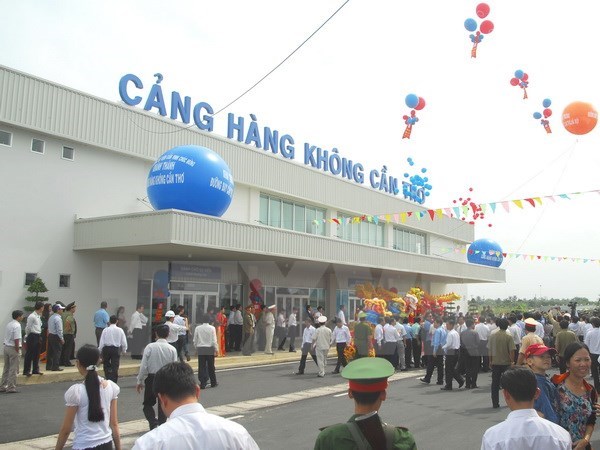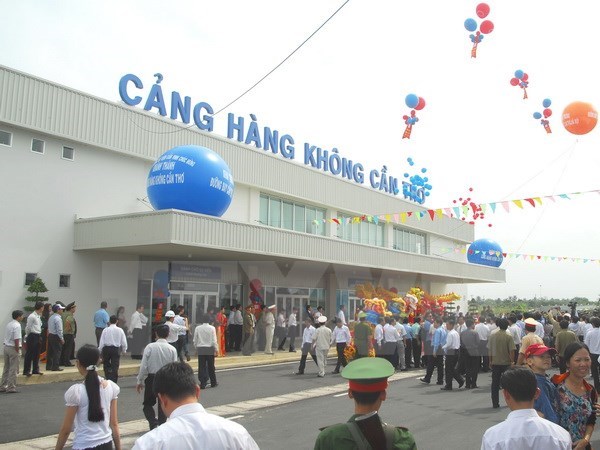
The Mekong Delta city of Can Tho will open more direct domestic and international routes, targeting promising markets in Southeast and Northeast Asia.
Can Tho Airport (Source: VNA)
The information was revealed by Le Tien Dung, Deputy Director of the Can Tho
Department of Transport, at a working session between the municipal People’s
Committee and the Civil Aviation Authority of Vietnam (CAAV) on July 12.
Accordingly, routes connecting Can Tho and the northern port city of Hai Phong,
Vinh city in central Nghe An province, Cam Ranh city in central Khanh Hoa city,
Hue city in central Thua Thien-Hue province and Da Lat city in the Central
Highlands province of Lam Dong will be launched in the coming time.
At the same time, Can Tho will consider opening routes to the Republic of
Korea, Japan and Singapore, aiming to attract more investments from these
countries in the city and the Mekong Delta as well.
Air routes from Can Tho to Taiwan and other foreign destinations are also
expected to be opened in the future.
According to Dung, there is a high demand for aviation transport from Can Tho
International Airport to other Vietnamese cities and provinces and foreign
countries as the city is the centre of the Mekong Delta.
The new air routes are expected to help ease the overload of Tan Son Nhat
International Airport in Ho Chi Minh City, while reducing travel cost and time,
he added.
Speaking at the working session, Vo Huy Cuong, CAAV deputy head, pointed to the
need to cut ticket prices of domestic flights from Can Tho, which , he said,
still remain high.
The CAA also pledged to create favourable conditions for Can Tho to launch the
new routes.
Le Thanh Phong, Chairman of the Mekong Delta Tourism Association, called for
joint efforts of the entire region to help Can Tho successfully conduct air
routes.
The municipal People’s Committee vowed to facilitate the operation of airlines
in Can Tho International Airport.
The Mekong Delta welcomed more than 28 million visitors in 2016 and over 20
million in the first half of this year. The number is expected to sharply
increase in the time ahead.-
Source: VNA
According to data from the Hoa Binh Provincial Party Committee, the industrial production index for the first six months of 2025 is estimated to have increased by 20% compared to the same period last year. This marks the highest year-on-year growth rate for this period since 2020.
In the first six months of 2025, Hoa Binh province’s export turnover was estimated at 1.145 billion USD, marking an 18.11% increase compared to the same period in 2024. Import turnover was estimated at $ 804 million, a 17.15% increase, which helped the province maintain a positive trade balance.
The lives of the ethnic minority farmers in Tan Lac district have gradually improved thanks to the new directions in agricultural production. This is a testament to the collective strength fostered through the professional associations and groups implemented by various levels of the district’s Farmers’ Union.
With the motto the "product quality comes first,” after nearly one year of establishment and operation, Muong village’s Clean Food Agricultural and Commercial Cooperative, located in Cau Hamlet, Hung Son Commune (Kim Boi district), has launched reputable, high-quality agricultural products to the market that are well-received by consumers. The products such as Muong village’s pork sausage, salt-cured chicken, and salt-cured pork hocks have gradually carved out a place in the market and they are on the path to obtaining the OCOP certification.
In the past, the phrase "bumper harvest, rock-bottom prices" was a familiar refrain for Vietnamese farmers engaged in fragmented, small-scale agriculture. But today, a new spirit is emerging across rural areas of Hoa Binh province - one of collaboration, organisation, and collective economic models that provide a stable foundation for production.
Maintaining growing area codes and packing facility codes in accordance with regulations is a mandatory requirement for agricultural products to be eligible for export. Recently, the Department of Agriculture and Environment of Hoa Binh province has intensified technical supervision of designated farming areas and packing facilities to safeguard the "green passport" that enables its products to access international markets.



